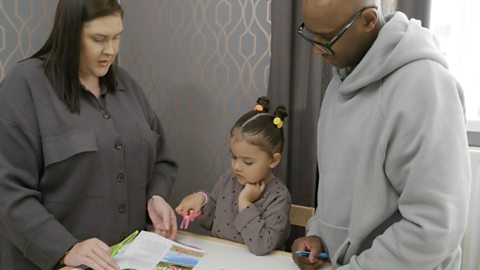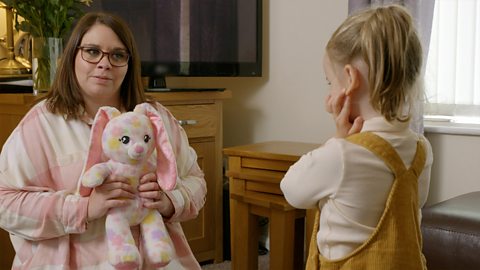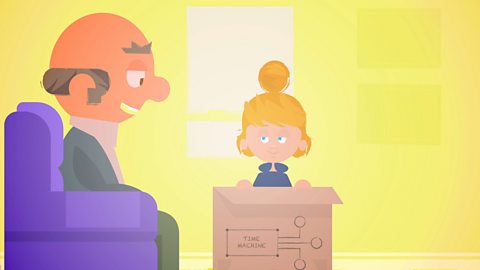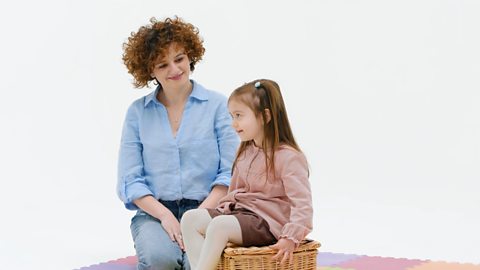Home > Activities > 3-4 years
Does your child love to tell you about what they've been up to?
When they reach around three years old, children start to remember events that happened in the past and might start to talk to you about them.
Encouraging them to talk about past events will stimulate their brain to think about things beyond just what's in front of them and ultimately help their speech and language development.
The video below shows how using the past tense with your child will encourage them to form more complex sentences in a new tense.
Where did we build sandcastles?
At the beach.
At the beach.
And what happened?
I fell in the water.
You were splashing in the sea, weren't you?
Yeah. But you were okay! What did we do when we went to the beach, Erik?
We made sandcastles.
That's right, we did.
Did you decorate your sandcastle?
Yeah.
And what did we use to decorate it?
Feathers and shells.
Wow.
What did you do yesterday that you told me you were so brave about?
I had my injection.
You had your injections, didn't you?
Yeah.
How did that feel?
Um… Bad.
Bad? But you are so strong and brave!
Yeah!
Do you know when we were at the beach? Did we go in a boat?
No.
Did we…Too wet!
It was too wet, wasn't it?
Fishies down there.
Yeah, there's fishies down there, isn't there?
What did you like best about the beach?
The ice cream! I want to do that again.
You want to do that again?
Yeah.
Where did you have your injections?
Here and here. In both of the arms!
Wow…And do they feel better today?
Yeah!
We went looking for shells, and we found different coloured shells, didn't we?
Little orange. Little orange ones.
What else did you do?
There was ducks there as well.
There was ducks there as well. Yeah. Can you remember how many ducks there were?
Loads!
Loads? Yeah. Was it more than ten?
This many!
Well done for remembering all that, Erik. I love hearing about your memories.
What are the language benefits of talking about the past with your child?
- Talking about the past encourages children to use longer sentences.
- This activity helps children develop their vocabulary and their understanding of sentence structure.
- It encourages them to practise the grammar of the past tense, which is an important next step for language development.
- It allows them to express their opinion about an event and explain their reasoning behind that.
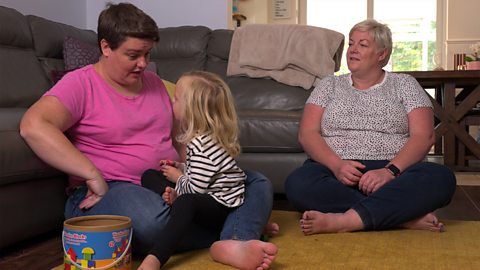
Top tips for talking about the past with a preschooler
Use open question words, such as what, where, when and why. This will encourage them to use words instead of just saying yes or no.
If they struggle to answer the questions initially give them a choice. You could say, "Did we go by car or bus?", "Did we buy apples or bananas?", "Did we see Nanny or grandpa?"
If they reply with an incomplete sentence, don't correct them, just expand the sentence and repeat back to them. This technique helps your child absorb new sentences in context.
If they are struggling to remember, you can use photos or objects to prompt them.
For example, if you go to the shops, lay out the money, receipt, some of the items you bought and a shopping bag. Help them think through how they got there, what they bought and how they paid.
You can also encourage them to practise recalling what they have done through the day when they chat to family members on the phone, video call, or face to face.
Remember to introduce new words every day and explain them to your child. The more they see, hear, and experience language, the more likely their sentences will develop.

More information on talking about the past
Learning to talk about the past is a key part of language learning. We've got loads more information about this across our website.
- What is decontextualising? And why is it important for your child to practise it?
- How does talking about the past help children's language skills? We put it to the test in our Speech Lab.
- When does your child learn to talk about the past? This short video explains everything you need to know.
- Take it one step further and play memory games with your child.
- Check out the łÉČËÂŰĚł Bitesize learning guide for past, present and future tense.

